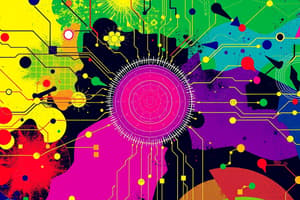Podcast
Questions and Answers
What does ICT stand for?
What does ICT stand for?
- Intelligent Communication Techniques
- Information and Communication Technology (correct)
- Internet and Communication Technology
- Integrated Communication Tools
Which technological trend is primarily contributing to the growth of connected devices?
Which technological trend is primarily contributing to the growth of connected devices?
- Cloud computing
- Artificial intelligence
- Internet of Things (IoT) (correct)
- Big Data analytics
What is a major economic impact of ICT?
What is a major economic impact of ICT?
- Decrease in job availability
- Isolation of tech sectors
- Significant contributor to GDP (correct)
- Reduction in digital services
What educational focus is essential for adapting to the current ICT environment?
What educational focus is essential for adapting to the current ICT environment?
What ongoing challenge in ICT includes concerns over data protection?
What ongoing challenge in ICT includes concerns over data protection?
Flashcards are hidden until you start studying
Study Notes
Current State of ICT
-
Definition of ICT: Information and Communication Technology encompasses all technologies used to handle telecommunications, broadcast media, intelligent building management systems, and audio-visual processing and transmission systems.
-
Global Trends:
- Rapid digital transformation across industries.
- Increased adoption of cloud computing, big data, and artificial intelligence.
- Growth of Internet of Things (IoT) with billions of connected devices.
-
Economic Impact:
- Significant contributor to GDP in many nations.
- Job creation in tech sectors, although facing challenges from automation.
- Digital economy continuing to expand, with e-commerce and digital services booming.
-
Infrastructure Development:
- Expansion of high-speed internet and mobile networks (5G).
- Increased investment in broadband access to underserved areas.
- Focus on cybersecurity infrastructure amid rising cyber threats.
-
Education and Skills Development:
- Emphasis on STEM education and digital literacy programs.
- Need for continuous reskilling and upskilling of the workforce.
- Growth of online learning platforms and remote education tools.
-
Regulatory Environment:
- Stricter regulations on data protection and privacy (e.g., GDPR).
- Ongoing discussions about net neutrality and digital monopolies.
- Governments fostering innovation while ensuring consumer protection.
-
Challenges:
- Digital divide persists between developed and developing regions.
- Cybersecurity threats and data breaches remain critical concerns.
- Environmental impact of ICT, including e-waste and energy consumption.
-
Future Outlook:
- Continued integration of AI and machine learning in various sectors.
- Advancements in quantum computing and its implications for data processing.
- Increased focus on sustainable ICT practices to mitigate environmental issues.
Definition of ICT
- Information and Communication Technology (ICT) includes technologies for telecommunications, broadcast media, intelligent building management, and audio-visual processing.
Global Trends
- Rapid digital transformation is reshaping industries.
- Cloud computing, big data, and artificial intelligence adoption are increasing significantly.
- The Internet of Things (IoT) is expanding with billions of connected devices.
Economic Impact
- ICT is a major contributor to the GDP of various nations.
- Job creation in the tech sector is ongoing, but automation poses challenges.
- The digital economy is thriving, especially in e-commerce and digital services.
Infrastructure Development
- Expansion of high-speed internet and mobile networks, including 5G technology.
- Investments are rising to improve broadband access in underserved areas.
- Cybersecurity infrastructure is a focus due to increasing cyber threats.
Education and Skills Development
- STEM education and digital literacy are emphasized for future workforce readiness.
- Continuous reskilling and upskilling of employees are necessary to keep pace with technological changes.
- Online learning platforms and remote education tools are growing rapidly.
Regulatory Environment
- Data protection regulations, such as GDPR, are becoming stricter.
- Discussions on net neutrality and the regulation of digital monopolies are ongoing.
- Governments are promoting innovation while ensuring consumer protections.
Challenges
- The digital divide persists, affecting access between developed and developing regions.
- Cybersecurity threats, including data breaches, remain significant issues.
- The environmental impact of ICT is notable, particularly concerning e-waste and energy use.
Future Outlook
- Further integration of artificial intelligence and machine learning is anticipated across various sectors.
- Advancements in quantum computing promise to enhance data processing capabilities.
- Emphasis on sustainable ICT practices is expected to address environmental concerns.
Studying That Suits You
Use AI to generate personalized quizzes and flashcards to suit your learning preferences.



